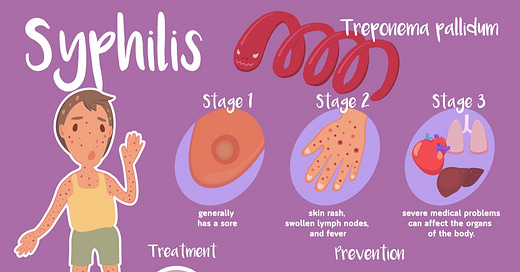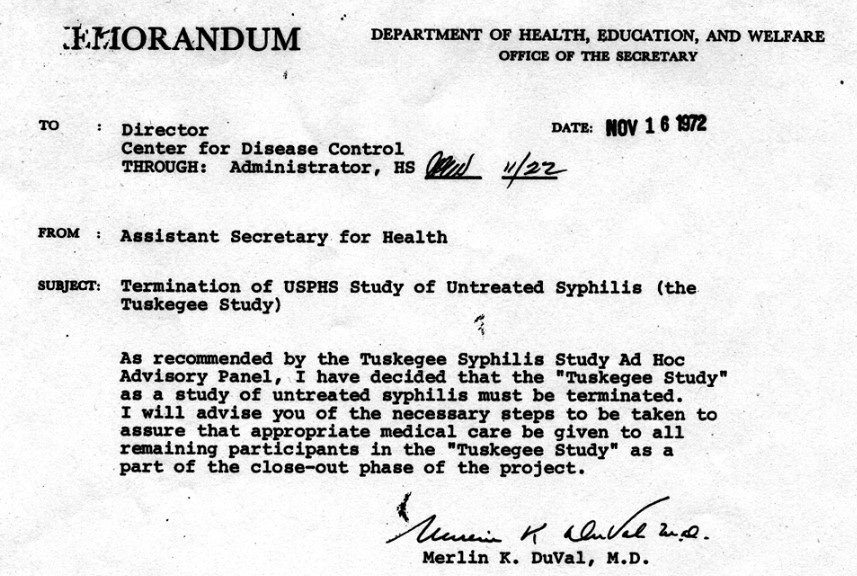A Call for Remembrance, Acknowledgement, and Action
On the 50th anniversary of the official end of the US Public Health Service Syphilis Study
50 years ago today, the Assistant Secretary for Health at (what was then) the Department of Health, Education, and Welfare officially ended the US Public Health Service Study of Untreated Syphilis, which is often called “Tuskegee” or the “Tuskegee Syphilis Study.”
The study, originally titled The Tuskegee Study of Untreated Syphilis in the Negro Male when started in 1932, was one of the most unethical medical experiments of all time and has become a clear example of racism in medicine, public health, and human research (in the not-so-distant past).
The study was conducted by the US Public Health Service in Macon County, Alabama — which was referred to as the Black Belt in the 1930s because of its rich soil and large population of black sharecroppers who were the economic backbone of the region — from 1932-1972. The goal of the study was to observe the natural history of untreated syphilis.
This begs the question — what is syphilis?
Syphilis is a sexually transmitted infection (STI) caused by a bacterium, Treponema pallidum, that can cause serious health problems and death if left untreated. Edouard Manet, Oscar Wilde, and Al Capone all died syphilis.
Syphilis is spread through direct contact with a syphilis sore during vaginal, anal, or oral sex. Syphilis can also pass from a pregnant individual to a fetus. You CAN NOT get syphilis through casual contact with an object, such as a toilet seat or hot tub.
Syphilis is often called The Great Imitator because early on in the course of the disease the signs and symptoms of syphilis mimic those of other diseases. The disease presents in three stages — primary syphilis, where an individual has a painless, but highly infectious sore (or two) on their genitals; secondary syphilis, which is characterized by a skin rash; and tertiary syphilis (that can occur 10-30 YEARS after the first sore appears) causes damage to your internal organ (including the brain).
Back in 1932, the US Public Health Service knew that the health effects of syphilis could take years to present and they wanted to understand the long-term course of illness caused by syphilis. And so they recruited 600 men in Macon County, Alabama to participate in a study on syphilis. Individuals between the ages of 25-60 were recruited and were told they would receive free medical care if they participated in a study on bad blood, a colloquial term used to describe anemia, fatigue, and other conditions. The study procedures included blood tests, x-rays, spinal taps, and autopsies of those who died. NOTE: it is a myth/not true that the men were given syphilis as part of the study. Again, this is NOT true. The men who were subjects either had syphilis or contracted it (through sex) during the study.
None of the men (and eventually women and children) who participated in the trial were aware of the fact that the US Public Health Service was studying syphilis.
And throughout the 40 years of the trial, the researchers worked actively to ensure that their subjects did not receive treatment for syphilis. Specifically, in the 1930s and 1940s, the US Public Health Service researchers provided lists of participants to local doctors and departments of health asking them not to treat these individuals.
By 1947, penicillin became the standard of care for syphilis (fun fact: penicillin is still the standard of care for syphilis today). While treatment centers were being set up across the country to treat individuals with syphilis, the US Public Health Service was actively preventing the 399 black men in the study at that time from receiving the same treatment.
In 1965, the US Public Health Service researchers were still actively preventing their subjects from receiving treatment. And they argued that it was too late to give the men penicillin, as (and I quote) “the syphilis had progressed too far for the drug to help.” It is important to note — this was an argument of convenience, as penicillin was then and still is today recommended for the treatment of all three stages of syphilis.
Despite healthcare workers, public health professionals, and the US Public Health Service knowing about the study and its unethical and racist practices, the study went on for 40 years. In 1972 — the study and all of its atrocities were brought to light in a whistle-blower article written by the Associated Press.
And then in November 1972 — 50 years ago today — the federal government officially shut down the US Public Health Service Syphilis Study at Tuskegee.
Following the publication of the article in the New York Times, the NAACP launched a class action lawsuit against the US Public Health Services. The case was settled for $10 million and the US Public Health Service agreed to pay for the medical treatments of all surviving participants and infected family members, the last of whom died in 2009.
In 1997, President Clinton issued an apology for the “study done in Tuskegee” —
The eight men who are survivors of the syphilis study at Tuskegee are a living link to a time not so very long ago that many Americans would prefer not to remember, but we dare not forget. It was a time when our nation failed to live up to its ideals, when our nation broke the trust with our people that is the very foundation of our democracy. It is not only in remembering that shameful past that we can make amends and repair our nation, but it is in remembering that past that we can build a better present and a better future. And without remembering it, we cannot make amends and we cannot go forward.
On the 50th anniversary of the official end of the US Public Health Service Syphilis Study at Tuskegee, what should each of us remember, acknowledge, and do?
Today, let us remember — In the words of President Clinton —
“So today America does remember the hundreds of men used in research without their knowledge and consent. We remember them and their family members. Men who were poor and African American, without resources and with few alternatives, they believed they had found hope when they were offered free medical care by the United States Public Health Service. They were betrayed.
Medical people are supposed to help when we need care, but even once a cure was discovered, they were denied help, and they were lied to by their government. Our government is supposed to protect the rights of its citizens; their rights were trampled upon. Forty years, hundreds of men betrayed, along with their wives and children, along with the community in Macon County, Alabama, the City of Tuskegee, the fine university there, and the larger African American community.
The United States government did something that was wrong -- deeply, profoundly, morally wrong. It was an outrage to our commitment to integrity and equality for all our citizens.”
Today, let us acknowledge — Two things.
First, this is not the Tuskegee Syphilis Study or just Tuskegee. This was the US Public Health Service Syphilis Study. This study and everything that was wrong/unethical with it should be named after and blame/shame should be placed on the US Public Health Service. We must stop referring to the events that took place in Macon County, Alabama as “Tuskegee.”
Second, the US Public Health Service Syphilis Study in Macon County, Alabama (1932-1972) is not a singular event of racism, abuse, and misconduct in medicine. Instead, it serves as an example and metaphor for racism in medicine, misconduct in human research, and government abuse of black people.
Today let us commit to learning more. More about the history of racism in medicine. More about the history of racism in public health. More about the health inequalities that exist. More about how racism is a public health crisis.
If you are a reader, please commit to reading Bad Blood or Medical Apartheid. If you are a podcast listener, do not miss Color Code (season 2 is coming soon). And if you are a watcher (of movies or TV shows), please watch Dr. Vanessa Northington Gamble’s talk It’s Not Just About Tuskegee.
Today, we remember the betrayal and acknowledge the power structures (within our own government) that allowed such a study to continue for 40 years. And we must all commit to learning more about racism and health.
Have a question?







